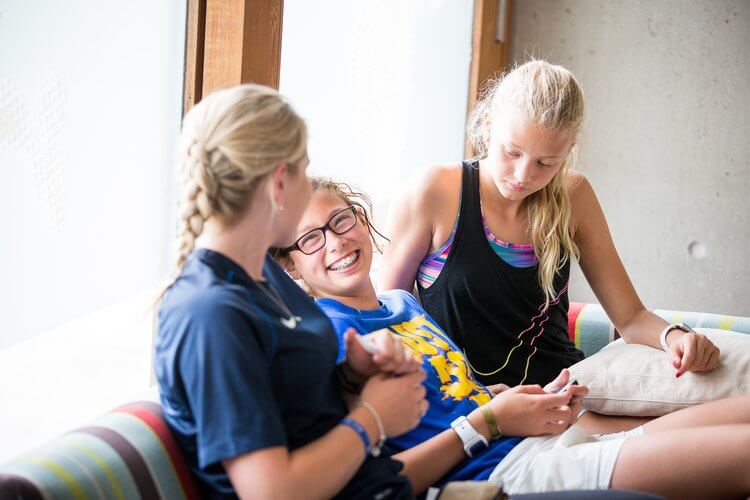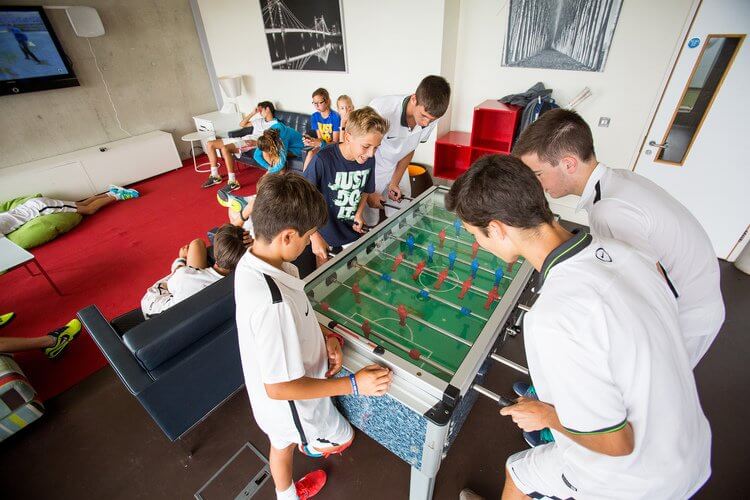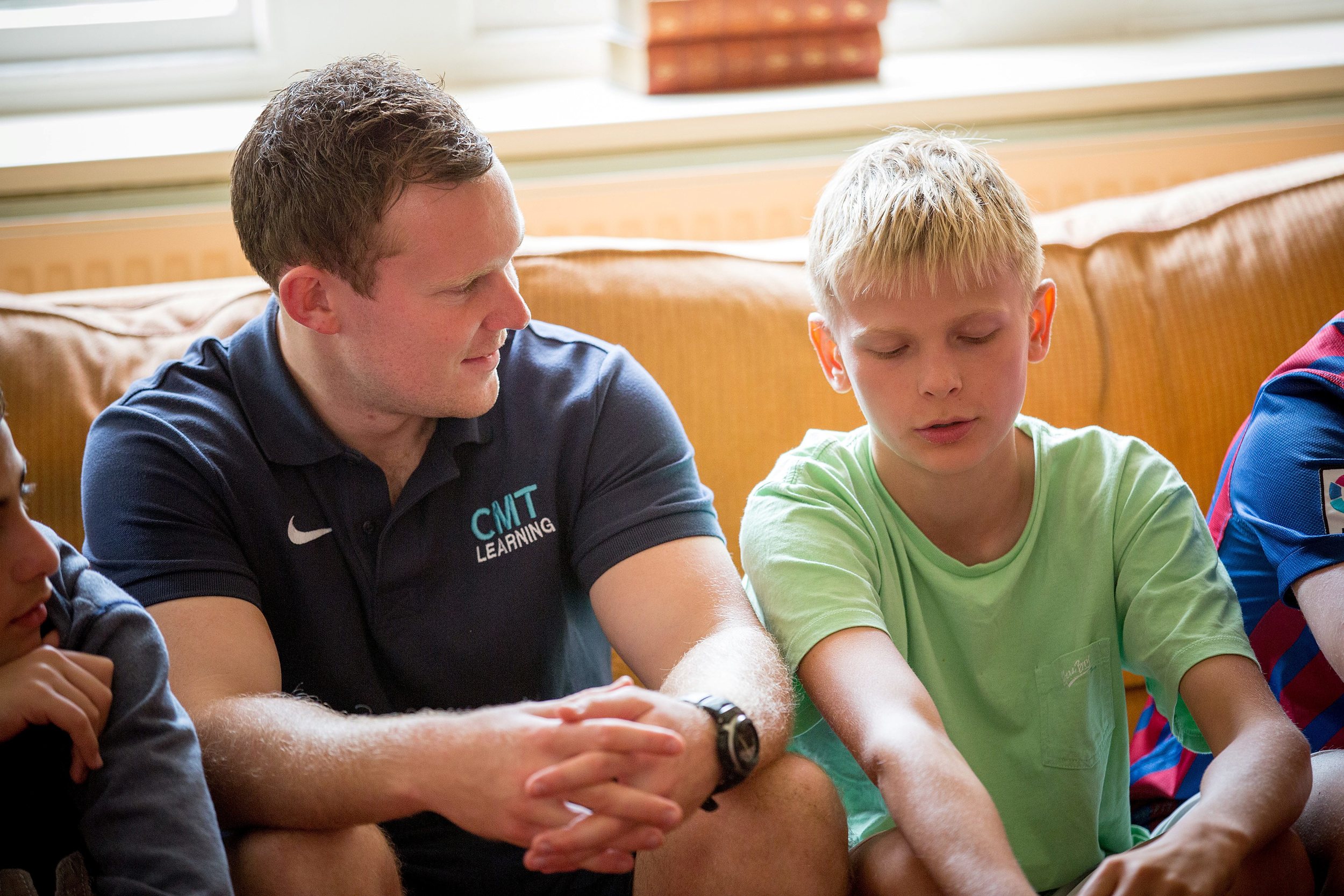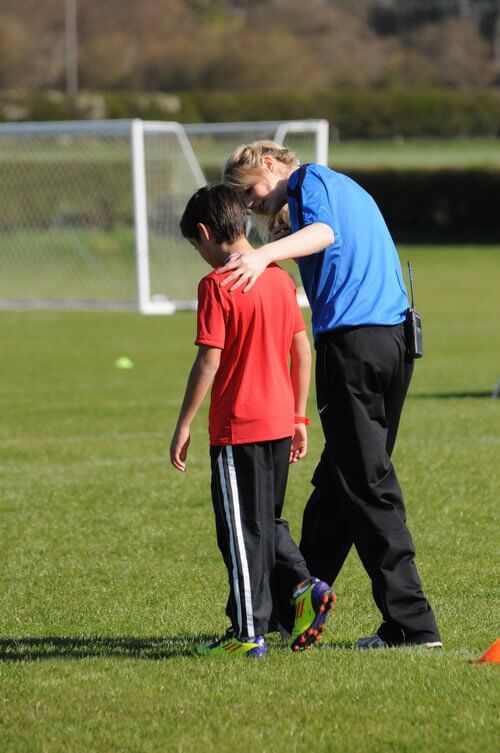Our Approach to Child Welfare
The welfare of every child on our camps is vitally important. We will treat your child as one of our own, (we’ll need them to eat well, behave and go to bed on time) but their safety and well-being will always be our main concern. We take ‘in loco parentis’ very seriously.
We strongly believe that when sport is integrated with academic studies it helps the development of young people in a more balanced way. It can help create a positive mindset to deal with challenges now and in the future, it will help young people feel good about themselves and function well, individually or in relationships. Sport can help with the feeling of connection, help with control and above all, provide a sense of purpose for young people.
Physical activity can improve well-being on our camps:
Exercise helps children release excess energy, but it can also help clear their minds to focus on work and how they interact with others. Our comprehensive curriculum will ensure they get a good night's sleep, which can then help to improve focus and productivity in lessons and workshops.
Sport makes us feel good! Endorphins released after exercise help us feel more positive, especially after creating new friends and teammates during their time on campus
Those wonderful endorphins, also help manage stress, help with relaxation and through our workshops our staff will help children learn new skills to focus the mind on what is important to them.
We know that physical activity can positively influence levels of individual development in learning*. Children attending our immersive English language & Sport programme will learn faster and retain more knowledge by combining it with sport.
We believe in educating young people on our camps and will provide them with information on how to become a better person & player. We show them how to access careers in sport, how to manage themselves efficiently and how to develop relationships. When they return home, they will be full of new knowledge that parents can benefit from too. Let them increase their confidence and teach you.
How you can help
Please help us create a safe and secure environment for your child by providing all requested medical, emergency contact and travel information, at least 8 weeks before arrival. After making a booking you can add this information HERE
We have a dedicated child welfare team on-site 24/7 at every camp. The welfare team ensures the safety and well-being of every child, both physically and emotionally. Other responsibilities include getting children to lessons and training on time, with the right kit and equipment. We also ensure they are eating enough and getting enough sleep to be able to cope with the demands of an intensive sports camp.
Our staff are carefully selected and trained, by us. All staff hold an enhanced DBS background check to ensure they are suitable to work with children. Our staff also complete a range of courses to support them in managing children in sporting and academic environments, away from home in an international setting.
All senior staff will have extensive experience working with children, usually in a school or summer camp setting. We usually have a ratio of 1 Adult Staff: 5 or 6 Children.
Parent Contact
Naturally, during the first few days of the camp, some children may become anxious or homesick. Our staff are trained to identify these signs and offer support and comfort to children who are affected. We understand that some children may not ask for help but will do our best to notice signs that children are struggling in a new environment.
As children settle and get involved in camp activities, this usually subsides. Contact with home during the first three days at the camp can increase these feelings so we encourage parents to help their children become more independent by minimising this in the first few days. We know your child will make friends through shared interests and our staff will organise activities outside of sport and lessons to speed this process up.
Our staff are taught to notice changes in a child’s behaviour which can indicate an increase in stress levels and staff will be proactive to ensure your child is supported to help them overcome any issues and make the best of their time with us.
Illness and Medication
We have nursing staff at each camp who are qualified in first-aid and in the administration and dispensation of medicines with full access to an on-call Doctor if required. On arrival, nurses will assume responsibility for all prescribed medication that a child is carrying with them and will then dispense this medication to them, as indicated. All other ‘over-the-counter’ medication is provided by us and dispensed by our nurses on-site. Any undisclosed medication brought by children will be removed and returned to the parents or the child on departure.
It is essential that the medication is labelled in English and that our medical staff understand what they are prescribed for and what dosage has been directed by the child’s doctor at home. We may occasionally require clarification from you concerning certain drugs. *use agreed wording from Dr SS
We will have a designated person on camp (Camp Liaison Officer) who will contact you if your child is unwell and/or unable to participate in activities. They will be available between 9 am-5 pm, Monday – Friday and will liaise with our nursing staff and remote doctor.
If recommended by our nurse or doctor, we will take your child to the hospital. A member of our staff will stay with your child throughout any hospital or clinic visit.
The Child Welfare Form you complete is very important, especially if your child has any existing medical conditions we need you to complete this fully before arrival. Please also ensure we are advised by you of any subsequent changes to your child’s condition or medication.
Sports Injuries on camp
There will be a Sports Therapist or Physiotherapist on-site during sports sessions in case of injuries. They will assess and treat minor injuries and provide a recovery plan for children with injuries which stop them from playing sport for one or more days.
Parents will be informed of any serious injury that prevents their child from participating in sports sessions. If any injury requires specialist medical attention the child will be assessed either by our on-site nurse or via a remote consultation with our doctor, or both. Depending on the advice provided, a child will either be treated and monitored at camp or, in the event of a more serious condition, will be taken by our staff to the nearest hospital normally located within 30 minutes of the camp. In the unlikely event of a serious injury, children will be taken to hospital immediately.
Our coaches use extended warm-up and cool-down exercises in every sports session help to minimise the risk of injury.
New sports footwear can cause blisters, particularly in the summer when the ground is hard. If your child has new trainers or boots we advise them to ‘wear them in’ before the camp starts. We can treat blisters, along with any other minor injuries – abrasions, strains, and bruising.
Pre-existing injuries
If a child has sustained an injury before the camp but can attend, please inform us in writing before arrival and advise what the medical diagnosis and treatment plan is. If you are bringing your child to the camp yourself, please brief our staff on arrival.
Our medical staff will assess the injury on the first day and offer advice. We take all injuries seriously and we recognise that some children will want to play with their injury even if it is causing discomfort. Our medical team will evaluate injuries daily. We follow their recommendations on whether a child should or should not play sport. While this might be frustrating for the child, these decisions are always taken in their long-term interests. This can result in the child departing camp early, which will be covered by your insurance. Some children make friends and want to stay on campus for the full duration but if this is for longer than 2/3 days, it is not in the best interest of the child.
Diet, Nutrition and Hydration
Staff on site will monitor the amount and quality of food children are eating and drinking at mealtimes. Water is always available during sports sessions and coaches ensure children regularly re-hydrate. We teach the children about the importance of nutrition and hydration in workshops and throughout the camp.
We can cater for most dietary requirements when notified in advance. You can do this in the PLAYER WELFARE FORM or by email to info@eurosportscamps.com
Meals on our camps are nutritionally balanced and designed for young athletes. We provide a variety of meal options to choose from, including a vegetarian option. Meal times are selected to ensure children maximise the time being coached or taught on our camps.
All children on camp are expected to do their best in every session, lesson, or activity. Our camp ethos and behaviour policy are designed to ensure that each child can safely enjoy their time on camp. You can view the camp ethos HERE.
We respond quickly to issues of fighting, verbal and physical intimidation, bullying or persistent bad behaviour. Under UK law, the use of alcohol, tobacco and drugs are strictly prohibited.
parent contact
It’s natural that during the first few days of the camp some players get homesick. Our staff are trained and experienced in identifying signs of homesickness and offering support and comfort. As players settle into the camp and get involved in camp activities, homesickness usually subsides. Excessive contact with home during the first couple of days at the camp can make homesickness worse so we encourage parents to help their children become more independent but will work closely with parents to ensure the best experience for every child. Our staff are also trained to identify any emotional changes or abnormalities in a players’ behaviour and will ensure they are fully supported to overcome any issues and make the best of their time with us.
Mobile phones and camp bank
We operate a phone ‘bank’ system on every camp. Players give in their phones and valuables to the camp bank for safe-keeping. This is mandatory. Then each evening during free-time players can access their phones to call home and catch up on messages. They return their phones to the bank before they go to bed. Although we will always wake players up in the mornings, some players like to know the time when they’re in their bedrooms so we advise bringing a watch or alarm clock in this instance.
This system ensures phones don't get lost during sports sessions, distract players during English or keep them up at night. It also makes for a great social camp atmosphere encouraging interaction and new friendships.
Kit and equipment
On all of our camps there will be some kit or equipment that children are required to wear or use during their sessions. A full packing list for each sport/venue is available in the Parent Guide. Vital kit includes things like shin pads for football, proper footwear and of course a racket for tennis. Additionally players should bring ample sports kit, clothing for wet weather and heat, swimming kit, towels, a laundry bag, UK plug adapter and an alarm clock if desired.
Laundry
Every camp has free laundry facilities available on-site but we ask that players attending a 6-night camp bring enough clothing to last the camp. 13-night campers will be able to do laundry on the middle weekend of the camp.
Spending money
We often get asked how much spending money players should bring. As everything is included in the camp, players can get by without spending money but there is the opportunity to buy additional snacks on-camp and to buy souvenirs and extra food on trips. The camp is cashless so players tend to bring a UK-activated credit/debit card and might spend between £50 and £200. This is just a guide, there is no requirement to bring spending money.
Please note we are unable to arrange for additional spending money to be provided to players through parents calling our office and paying by card. Please ensure you supply your child with sufficient funds before the start of the camp.
Sports Therapy and injury
There is a Sports Therapist on-hand during sports sessions in case of injuries. They will assess and treat minor injuries on site, and will be available at other times of the day to offer support and advice. Parents will be informed of any serious injury that prevents players from participating in sports sessions. If any injury requires specialist medical attention the player will be taken by our staff to the nearest hospital or doctor’s surgery. All our venues are within 30 minutes of a hospital. In the unlikely event of a serious injury a player will be taken to hospital immediately.
Our coaches use extended warm-up and cool-down exercises in every sports session help to minimise the risk of injury.
If a player has sustained an injury prior to the camp but is able to attend, please inform us in writing prior to arrival and preferably advise what is the medical diagnosis, if you have received one. Alternatively, you can brief one of our staff on arrival at the camp. The sports therapist will assess the injury on the first day of the camp and offer advice. All staff will be notified of the injury so they can monitor any changes. We take all injuries seriously and we recognise that some young players will want to play with their injury even if it is causing discomfort. Our Sports Therapists will evaluate injuries on a twice daily basis and we follow their recommendations on whether a player should or should not play. This decision is taken in the long-term interests of the fitness of the player.
Illness and Medication
We have senior pastoral staff at each camp who are trained in first-aid and in the administration and dispensation of medicines. Please make sure that we understand what medicines your child requires and in what dosage and frequency. They will contact you if your child is unwell and unable to participate in activities to discuss the best course of action. They will also take your child to the doctor or hospital if necessary. If your child is taking medication when they start the camp, our staff will assist them to do so and keep their medicine in a safe place. The Player Welfare Form you complete before arriving will ask about medication but you may be asked again when you arrive at the camp to ensure the information is up to date.
ROOM SHARING
If you would like your child to share a room with a particular person, you can request this in the Player Welfare Form after making your booking. However, this person must be the same gender and the players must be less than 2 years apart in age.
We organise the camps in age groups so that each player gets the best out of their camp experience. Unless you have a room-share request, players will be roomed with others (often only one other) of a similar age (within 2 years). They may or may not speak the same native language.
Avoiding Blisters
New trainers, particularly in the summer when the ground is hard, can cause blisters. If your child has new trainers we advise to ‘wear them in’ before the camp starts, to avoid the risk of blisters. We can treat blisters, along with any other minor injuries – abrasions, strains and bruising.
Diet, nutrition and hydration
We check players are eating and drinking enough at each mealtime. Water is always available during sports sessions and coaches ensure players regularly re-hydrate. We also talk to the players about the importance of nutrition and hydration in workshops and throughout the camp.
We can cater for all dietary requirements when notified in advance. You can notify us of any dietary requirements in the Player Welfare Form or by email to info@eurosportscamps.com
Meals on our camps are nutritionally balanced and designed for young athletes. We provide a variety of meal options to choose from, including a vegetarian option. We teach and monitor each player to ensure they are eating and drinking enough during the camp and our coaches ensure players drink lots of water during training sessions.
COACHING GROUPS
Football & Field Hockey
We primarily group our players depending on age so they are all able to receive the best coaching experience possible.
Tennis
Players are grouped by ability and fitness. Age is also a consideration but usually, playing ability determines who plays in which group
We understand that players coming to our camps may want to be in the same group as their older siblings or friends, but we believe this grouping policy gives each player the safest and most appropriate coaching for them to develop as players.
ENGLISH GROUPS
Our English classes are grouped by students’ English language ability and age. Prior to camp, students’ are asked to complete an online English assessment. On arrival at camp each player will have a short conversation with an English language teacher which will further help us determine which class to place them in.
KEEPING IN CONTACT DURING CAMP
We understand that for some of our players, being away from home can be a little stressful to begin with. This is only natural. All our experienced staff are fully trained in identifying and dealing with players who are worried about being away from home. We believe that the majority of players will settle in and love their time on camp after a day or two of meeting new friends and taking part in lots of fun activities! Therefore, we do ask that you keep contact to camp minimal, especially during the first 3 days – but we will of course inform you if there are any persistent issues that occur. We will also pass on any personal messages that you can send to us via email. A senior member of our staff is always available should you wish to contact us to ask about your child.
BEHAVIOUR DURING CAMP
Whether you are a professional sports person or a player at our camp, you are expected to do your best both on and off the sports field. Our camp ethos and behaviour policy are designed to ensure that each player is safe and enjoys their time on all of our camps. You can view the camp ethos HERE.
We respond quickly to issues of fighting, verbal and physical intimidation or persistent bad behaviour. Our camps also provide a professional sporting environment and therefore the use of alcohol, tobacco and drugs are strictly prohibited.
INSURANCE
International Student Travel Insurance is included as part of your booking. Provided by Endsleigh, the cover includes emergency medical assistance and medical costs, protection in the event of cancellation or curtailment, and cover for loss, theft of, or damage to, baggage and personal money. You can find out more HERE






